英语句法结构介绍
- 格式:doc
- 大小:135.00 KB
- 文档页数:19
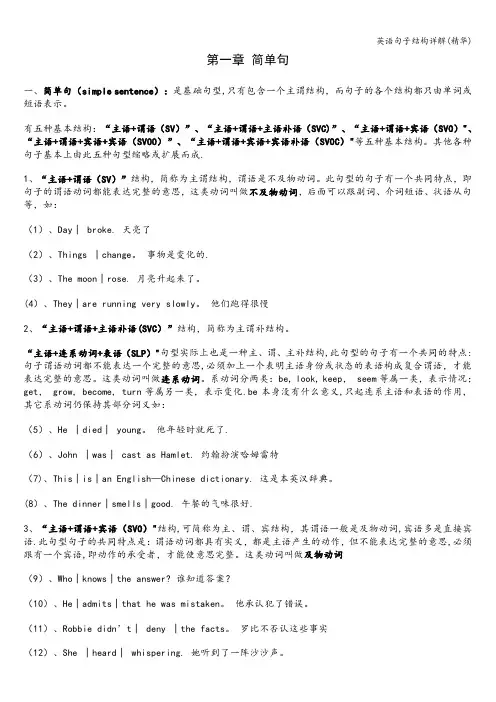
第一章简单句一、简单句(simple sentence):是基础句型,只有包含一个主谓结构,而句子的各个结构都只由单词或短语表示。
有五种基本结构:“主语+谓语(SV)”、“主语+谓语+主语补语(SVC)”、“主语+谓语+宾语(SVO)"、“主语+谓语+宾语+宾语(SVOO)”、“主语+谓语+宾语+宾语补语(SVOC)"等五种基本结构。
其他各种句子基本上由此五种句型缩略或扩展而成.1、“主语+谓语(SV)”结构,简称为主谓结构,谓语是不及物动词。
此句型的句子有一个共同特点,即句子的谓语动词都能表达完整的意思,这类动词叫做不及物动词,后面可以跟副词、介词短语、状语从句等,如:(1)、Day│ broke. 天亮了(2)、Things │change。
事物是变化的.(3)、The moon│rose.月亮升起来了。
(4)、They│are running very slowly。
他们跑得很慢2、“主语+谓语+主语补语(SVC)”结构,简称为主谓补结构。
“主语+连系动词+表语(SLP)"句型实际上也是一种主、谓、主补结构,此句型的句子有一个共同的特点:句子谓语动词都不能表达一个完整的意思,必须加上一个表明主语身份或状态的表语构成复合谓语,才能表达完整的意思。
这类动词叫做连系动词。
系动词分两类:be, look, keep, seem等属一类,表示情况;get, grow, become, turn等属另一类,表示变化.be本身没有什么意义,只起连系主语和表语的作用,其它系动词仍保持其部分词义如:(5)、He │died│ young。
他年轻时就死了.(6)、John │was│ cast as Hamlet. 约翰扮演哈姆雷特(7)、This│is│an English—Chinese dictionary. 这是本英汉辞典。
(8)、The dinner│smells│good.午餐的气味很好.3、“主语+谓语+宾语(SVO)"结构,可简称为主、谓、宾结构,其谓语一般是及物动词,宾语多是直接宾语.此句型句子的共同特点是:谓语动词都具有实义,都是主语产生的动作,但不能表达完整的意思,必须跟有一个宾语,即动作的承受者,才能使意思完整。
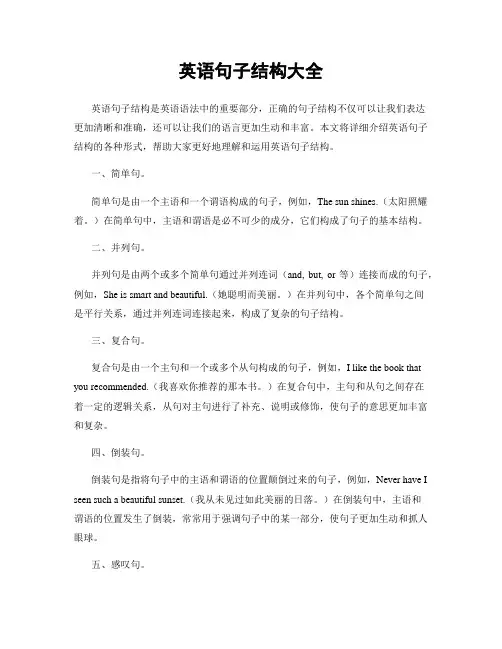
英语句子结构大全英语句子结构是英语语法中的重要部分,正确的句子结构不仅可以让我们表达更加清晰和准确,还可以让我们的语言更加生动和丰富。
本文将详细介绍英语句子结构的各种形式,帮助大家更好地理解和运用英语句子结构。
一、简单句。
简单句是由一个主语和一个谓语构成的句子,例如,The sun shines.(太阳照耀着。
)在简单句中,主语和谓语是必不可少的成分,它们构成了句子的基本结构。
二、并列句。
并列句是由两个或多个简单句通过并列连词(and, but, or等)连接而成的句子,例如,She is smart and beautiful.(她聪明而美丽。
)在并列句中,各个简单句之间是平行关系,通过并列连词连接起来,构成了复杂的句子结构。
三、复合句。
复合句是由一个主句和一个或多个从句构成的句子,例如,I like the book that you recommended.(我喜欢你推荐的那本书。
)在复合句中,主句和从句之间存在着一定的逻辑关系,从句对主句进行了补充、说明或修饰,使句子的意思更加丰富和复杂。
四、倒装句。
倒装句是指将句子中的主语和谓语的位置颠倒过来的句子,例如,Never have I seen such a beautiful sunset.(我从未见过如此美丽的日落。
)在倒装句中,主语和谓语的位置发生了倒装,常常用于强调句子中的某一部分,使句子更加生动和抓人眼球。
五、感叹句。
感叹句是用来表示强烈感情或情绪的句子,例如,What a beautiful flower it is!(多么美丽的花啊!)在感叹句中,常常使用感叹词来表示强烈的情感,使句子更加生动和有趣。
六、疑问句。
疑问句是用来提出问题或询问的句子,例如,Where is the nearest supermarket?(最近的超市在哪里?)在疑问句中,常常使用疑问词来引导问题,使句子更加明确和准确。
七、祈使句。
祈使句是用来表示命令、请求、建议等意义的句子,例如,Please pass me the salt.(请把盐递给我。
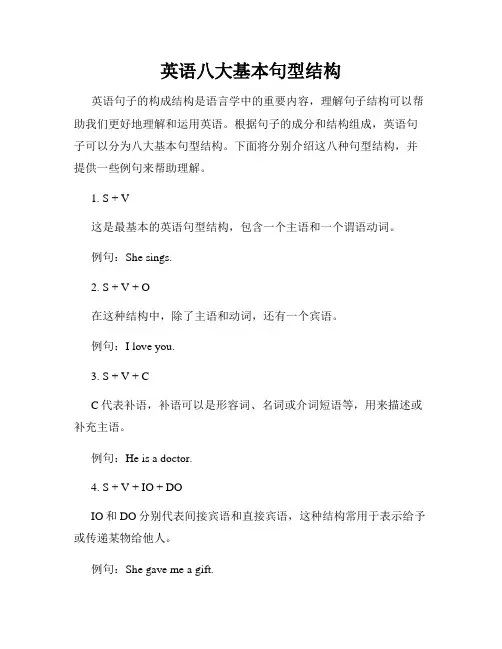
英语八大基本句型结构英语句子的构成结构是语言学中的重要内容,理解句子结构可以帮助我们更好地理解和运用英语。
根据句子的成分和结构组成,英语句子可以分为八大基本句型结构。
下面将分别介绍这八种句型结构,并提供一些例句来帮助理解。
1. S + V这是最基本的英语句型结构,包含一个主语和一个谓语动词。
例句:She sings.2. S + V + O在这种结构中,除了主语和动词,还有一个宾语。
例句:I love you.3. S + V + CC代表补语,补语可以是形容词、名词或介词短语等,用来描述或补充主语。
例句:He is a doctor.4. S + V + IO + DOIO和DO分别代表间接宾语和直接宾语,这种结构常用于表示给予或传递某物给他人。
例句:She gave me a gift.5. S + V + O + O.CO.C代表宾补,用来补充说明宾语的状态或特征。
例句:They elected him president.6. S + V + O + OCOC同样代表宾补,但在这种情况下,宾语是形容词,用于描述宾语。
例句:I find her beautiful.7. There + V + S这种结构通常用于强调存在或引起注意。
例句:There is a cat in the garden.8. It + V + S这种结构常用于表示天气、时间、距离等。
例句:It is raining outside.这八种基本句型结构是英语语法的基础,掌握好它们能够帮助我们更加准确地表达和理解英语句子。
通过不断的练习和运用,我们可以熟练地使用这些句型结构,使我们的英语表达更加流利和自然。
总结:了解和掌握英语句子的基本结构对于学习和提高英语能力至关重要。
通过熟悉这八种基本句型结构,我们可以更好地理解和运用英语,使我们的表达更加准确和流利。
不断练习和使用这些句型结构,将有助于我们在英语学习的道路上取得更大的进步。
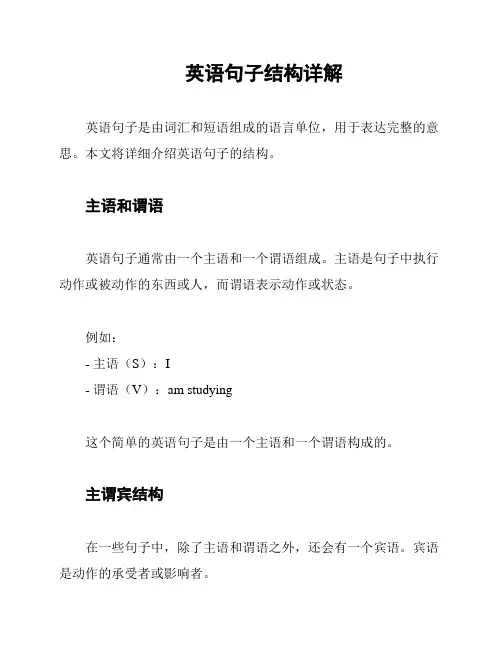
英语句子结构详解英语句子是由词汇和短语组成的语言单位,用于表达完整的意思。
本文将详细介绍英语句子的结构。
主语和谓语英语句子通常由一个主语和一个谓语组成。
主语是句子中执行动作或被动作的东西或人,而谓语表示动作或状态。
例如:- 主语(S):I- 谓语(V):am studying这个简单的英语句子是由一个主语和一个谓语构成的。
主谓宾结构在一些句子中,除了主语和谓语之外,还会有一个宾语。
宾语是动作的承受者或影响者。
例如:- 主语(S):She- 谓语(V):likes- 宾语(O):apples这个句子是由一个主语、一个谓语和一个宾语构成的。
主谓宾句子结构在英语中非常常见。
陈述句、疑问句和祈使句英语句子可以分为陈述句、疑问句和祈使句。
陈述句用来陈述事实或表达观点,通常是以主谓结构构成。
疑问句用来提问,通常是以疑问词开头,然后是主谓结构。
祈使句用来表示命令、请求或建议,通常是以动词开头。
例如:- 陈述句:I am studying English.- 疑问句:Are you studying English?- 祈使句:Study English every day.这些句子示例展示了不同类型的英语句子结构。
并列结构和从句英语句子还可以使用并列结构和从句来增强其表达能力。
并列结构是将两个或多个平等的成分连接起来,使用并列连词如"and"、"but"、"or"等。
从句是一个句子中的一部分,通常以连词引导,可以是主从复合句或非限制性从句。
例如:- 并列结构:I like to read books and watch movies.- 从句:She is studying English because she wants to travel around the world.这些句子结构的使用可以使英语句子更加多样化和复杂化。
总结英语句子的结构主要由主语、谓语和宾语组成,可以是简单的主谓结构,也可以包含并列结构和从句。
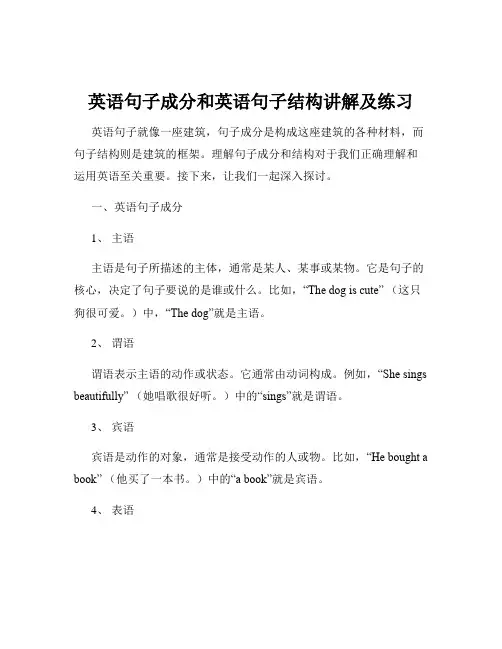
英语句子成分和英语句子结构讲解及练习英语句子就像一座建筑,句子成分是构成这座建筑的各种材料,而句子结构则是建筑的框架。
理解句子成分和结构对于我们正确理解和运用英语至关重要。
接下来,让我们一起深入探讨。
一、英语句子成分1、主语主语是句子所描述的主体,通常是某人、某事或某物。
它是句子的核心,决定了句子要说的是谁或什么。
比如,“The dog is cute” (这只狗很可爱。
)中,“The dog”就是主语。
2、谓语谓语表示主语的动作或状态。
它通常由动词构成。
例如,“She sings beautifully” (她唱歌很好听。
)中的“sings”就是谓语。
3、宾语宾语是动作的对象,通常是接受动作的人或物。
比如,“He bought a book” (他买了一本书。
)中的“a book”就是宾语。
4、表语表语用于说明主语的特征、状态、身份等。
常见的系动词有 be (am/is/are)、seem、look 等,其后的成分就是表语。
例如,“She is happy” (她很开心。
)中的“happy”就是表语。
5、定语定语用来修饰、限定名词或代词。
它可以是形容词、名词、代词、数词、介词短语等。
例如,“The red car is mine” (那辆红色的车是我的。
)中的“red”就是定语。
6、状语状语用于修饰动词、形容词、副词或整个句子,表示时间、地点、原因、方式、程度等。
比如,“He runs fast” (他跑得很快。
)中的“fast”就是状语。
7、补语补语用于补充说明宾语或主语的情况。
例如,“We made him our monitor” (我们选他当班长。
)中的“our monitor”就是宾语补足语。
二、英语句子结构1、简单句简单句只有一个主谓结构,是最基本的句子类型。
例如,“I love you” (我爱你。
)2、并列句并列句由两个或两个以上的简单句通过并列连词(and, but, or 等)连接而成。
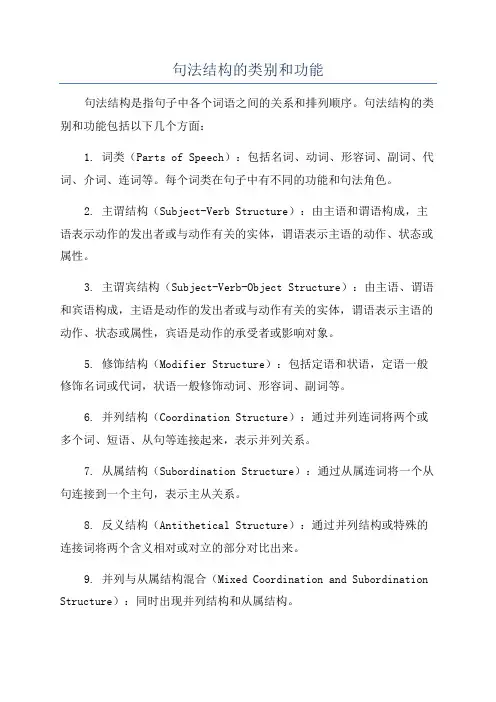
句法结构的类别和功能
句法结构是指句子中各个词语之间的关系和排列顺序。
句法结构的类别和功能包括以下几个方面:
1. 词类(Parts of Speech):包括名词、动词、形容词、副词、代词、介词、连词等。
每个词类在句子中有不同的功能和句法角色。
2. 主谓结构(Subject-Verb Structure):由主语和谓语构成,主语表示动作的发出者或与动作有关的实体,谓语表示主语的动作、状态或属性。
3. 主谓宾结构(Subject-Verb-Object Structure):由主语、谓语和宾语构成,主语是动作的发出者或与动作有关的实体,谓语表示主语的动作、状态或属性,宾语是动作的承受者或影响对象。
5. 修饰结构(Modifier Structure):包括定语和状语,定语一般修饰名词或代词,状语一般修饰动词、形容词、副词等。
6. 并列结构(Coordination Structure):通过并列连词将两个或多个词、短语、从句等连接起来,表示并列关系。
7. 从属结构(Subordination Structure):通过从属连词将一个从句连接到一个主句,表示主从关系。
8. 反义结构(Antithetical Structure):通过并列结构或特殊的连接词将两个含义相对或对立的部分对比出来。
9. 并列与从属结构混合(Mixed Coordination and Subordination Structure):同时出现并列结构和从属结构。
以上是句法结构的一些常见类别和功能,具体的句法结构还存在其他的复杂和特殊情况,根据具体语言的特点和之间的语言规则来决定。
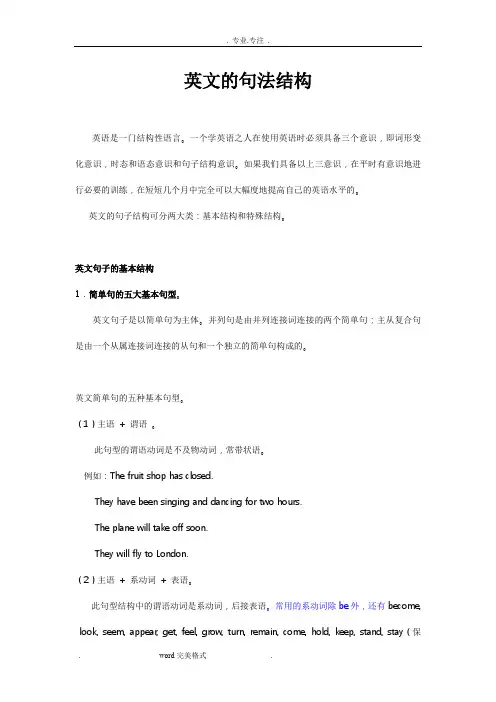
英文的句法结构英语是一门结构性语言。
一个学英语之人在使用英语时必须具备三个意识,即词形变化意识,时态和语态意识和句子结构意识。
如果我们具备以上三意识,在平时有意识地进行必要的训练,在短短几个月中完全可以大幅度地提高自己的英语水平的。
英文的句子结构可分两大类:基本结构和特殊结构。
英文句子的基本结构1.简单句的五大基本句型。
英文句子是以简单句为主体。
并列句是由并列连接词连接的两个简单句;主从复合句是由一个从属连接词连接的从句和一个独立的简单句构成的。
英文简单句的五种基本句型。
(1)主语+ 谓语。
此句型的谓语动词是不及物动词,常带状语。
例如:The fruit shop has closed.They have been singing and dancing for two hours.The plane will take off soon.They will fly to London.(2)主语+ 系动词+ 表语。
此句型结构中的谓语动词是系动词,后接表语。
常用的系动词除be外,还有become, look, seem, appear, get, feel, grow, turn, remain, come, hold, keep, stand, stay(保持),smell, sound, taste等等。
例如:The motor is out of order.Her mother has fallen ill.The weather is getting quite hot.The roses smell sweet.Silk feels soft and smooth.The plan sound perfect.(3)主语+ 谓语+ 宾语此句型中的谓语动词是及物动词,后面跟宾语。
例如:He studies English.The teacher corrected her poor pronunciation more than once.We should help the disabled.(4)主语+ 谓语+ 间接宾语+ 直接宾语。
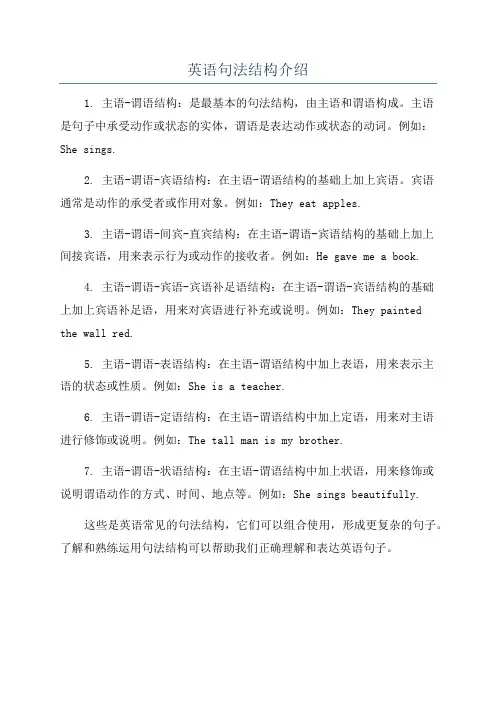
英语句法结构介绍
1. 主语-谓语结构:是最基本的句法结构,由主语和谓语构成。
主语
是句子中承受动作或状态的实体,谓语是表达动作或状态的动词。
例如:She sings.
2. 主语-谓语-宾语结构:在主语-谓语结构的基础上加上宾语。
宾语
通常是动作的承受者或作用对象。
例如:They eat apples.
3. 主语-谓语-间宾-直宾结构:在主语-谓语-宾语结构的基础上加上
间接宾语,用来表示行为或动作的接收者。
例如:He gave me a book.
4. 主语-谓语-宾语-宾语补足语结构:在主语-谓语-宾语结构的基础
上加上宾语补足语,用来对宾语进行补充或说明。
例如:They painted
the wall red.
5. 主语-谓语-表语结构:在主语-谓语结构中加上表语,用来表示主
语的状态或性质。
例如:She is a teacher.
6. 主语-谓语-定语结构:在主语-谓语结构中加上定语,用来对主语
进行修饰或说明。
例如:The tall man is my brother.
7. 主语-谓语-状语结构:在主语-谓语结构中加上状语,用来修饰或
说明谓语动作的方式、时间、地点等。
例如:She sings beautifully.
这些是英语常见的句法结构,它们可以组合使用,形成更复杂的句子。
了解和熟练运用句法结构可以帮助我们正确理解和表达英语句子。
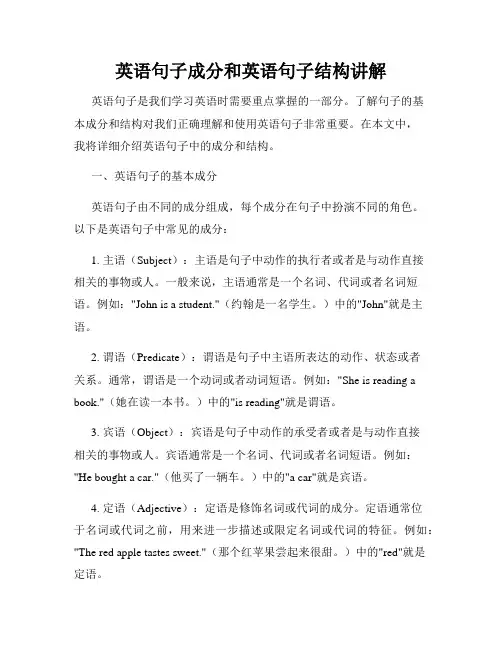
英语句子成分和英语句子结构讲解英语句子是我们学习英语时需要重点掌握的一部分。
了解句子的基本成分和结构对我们正确理解和使用英语句子非常重要。
在本文中,我将详细介绍英语句子中的成分和结构。
一、英语句子的基本成分英语句子由不同的成分组成,每个成分在句子中扮演不同的角色。
以下是英语句子中常见的成分:1. 主语(Subject):主语是句子中动作的执行者或者是与动作直接相关的事物或人。
一般来说,主语通常是一个名词、代词或者名词短语。
例如:"John is a student."(约翰是一名学生。
)中的"John"就是主语。
2. 谓语(Predicate):谓语是句子中主语所表达的动作、状态或者关系。
通常,谓语是一个动词或者动词短语。
例如:"She is reading a book."(她在读一本书。
)中的"is reading"就是谓语。
3. 宾语(Object):宾语是句子中动作的承受者或者是与动作直接相关的事物或人。
宾语通常是一个名词、代词或者名词短语。
例如:"He bought a car."(他买了一辆车。
)中的"a car"就是宾语。
4. 定语(Adjective):定语是修饰名词或代词的成分。
定语通常位于名词或代词之前,用来进一步描述或限定名词或代词的特征。
例如:"The red apple tastes sweet."(那个红苹果尝起来很甜。
)中的"red"就是定语。
5. 状语(Adverb):状语是修饰动词、形容词、副词、整个句子或者其他语法单位的成分。
状语通常用来表达时间、地点、方式、原因、程度等信息。
例如:"They ran quickly to the park."(他们快速地跑到了公园。
)中的"quickly"就是状语。
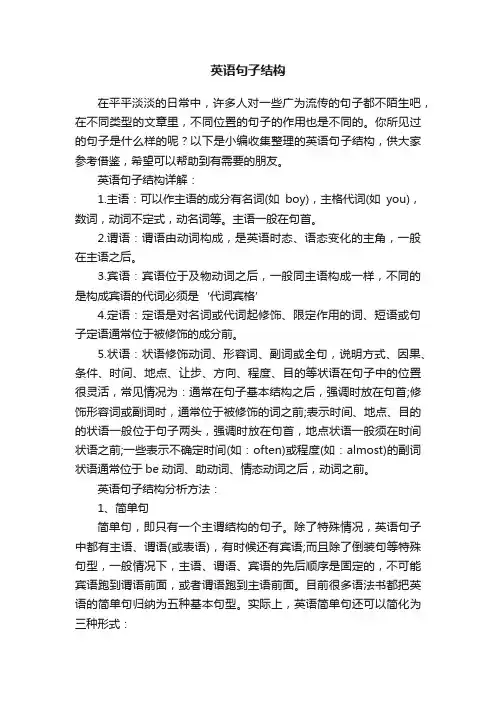
英语句子结构在平平淡淡的日常中,许多人对一些广为流传的句子都不陌生吧,在不同类型的文章里,不同位置的句子的作用也是不同的。
你所见过的句子是什么样的呢?以下是小编收集整理的英语句子结构,供大家参考借鉴,希望可以帮助到有需要的朋友。
英语句子结构详解:1.主语:可以作主语的成分有名词(如boy),主格代词(如you),数词,动词不定式,动名词等。
主语一般在句首。
2.谓语:谓语由动词构成,是英语时态、语态变化的主角,一般在主语之后。
3.宾语:宾语位于及物动词之后,一般同主语构成一样,不同的是构成宾语的代词必须是‘代词宾格’4.定语:定语是对名词或代词起修饰、限定作用的词、短语或句子定语通常位于被修饰的成分前。
5.状语:状语修饰动词、形容词、副词或全句,说明方式、因果、条件、时间、地点、让步、方向、程度、目的等状语在句子中的位置很灵活,常见情况为:通常在句子基本结构之后,强调时放在句首;修饰形容词或副词时,通常位于被修饰的词之前;表示时间、地点、目的的状语一般位于句子两头,强调时放在句首,地点状语一般须在时间状语之前;一些表示不确定时间(如:often)或程度(如:almost)的副词状语通常位于be动词、助动词、情态动词之后,动词之前。
英语句子结构分析方法:1、简单句简单句,即只有一个主谓结构的句子。
除了特殊情况,英语句子中都有主语、谓语(或表语),有时候还有宾语;而且除了倒装句等特殊句型,一般情况下,主语、谓语、宾语的先后顺序是固定的,不可能宾语跑到谓语前面,或者谓语跑到主语前面。
目前很多语法书都把英语的简单句归纳为五种基本句型。
实际上,英语简单句还可以简化为三种形式:主语 + 谓语(及物动词) + 宾语;I hate grammar.主语 + 谓语(不及物动词); Grammar sucks.主语 + 系动词 + 表语 Grammar is hell.所以,我们在阅读句子的时候,不管句子有多长,不管是并列句还是复合句,都必须首先分清各句中的主语、谓语(或表语),有的句子中还包括宾语。
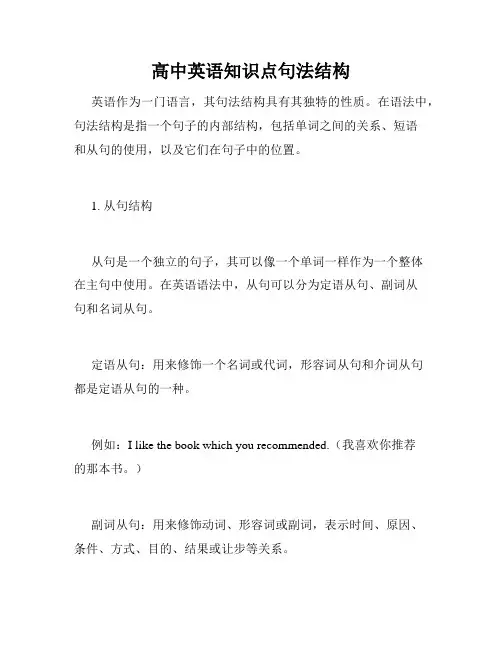
高中英语知识点句法结构英语作为一门语言,其句法结构具有其独特的性质。
在语法中,句法结构是指一个句子的内部结构,包括单词之间的关系、短语和从句的使用,以及它们在句子中的位置。
1. 从句结构从句是一个独立的句子,其可以像一个单词一样作为一个整体在主句中使用。
在英语语法中,从句可以分为定语从句、副词从句和名词从句。
定语从句:用来修饰一个名词或代词,形容词从句和介词从句都是定语从句的一种。
例如:I like the book which you recommended.(我喜欢你推荐的那本书。
)副词从句:用来修饰动词、形容词或副词,表示时间、原因、条件、方式、目的、结果或让步等关系。
例如:I'll come to see you after I finish my work.(我会在完成工作后来看你。
)名词从句:在主句中担任名词角色的从句,可以作为主语、宾语、表语等。
例如:What he said is very interesting.(他说的话很有趣。
)2. 并列结构在一个句子中,并列结构是指两个或两个以上的相同或不同的句子连接在一起,使用并列连词或标点符号。
并列结构可以分为均等联合和不均等联合。
均等连接词包括and、or、but、for、so、yet。
它们都可以用来连接原因、递进、转折、选择、结果或让步。
例如:I want to go to the movies, but I have to study.(我想去看电影,但是我必须学习。
)不均等连接词包括as well as、rather than、not only…but also、either…or、neither…nor、both…and等。
例如:He will neither dance nor sing.(他既不跳舞也不唱歌。
)3. 比较结构比较结构是指两个或多个事物在相互比较时所使用的语言结构。
比较结构可以分为三种类型:正比较结构、反比较结构和不定比较结构。
英语句法结构英语句法结构是指英语句子中词语的排列和组合形式。
根据句子的结构不同,英语句法结构可以分为简单句、复合句和复合句等几种类型。
1. 简单句的结构:简单句由一个主语和一个谓语组成,可以没有宾语或宾语是名词、代词或动名词短语。
例如:“He runs." (主语+谓语),“She eats an apple." (主语+谓语+宾语),“They are playing soccer." (主语+谓语+现在进行时动词短语)。
2. 复合句的结构:复合句由一个主句和一个或多个从句组成。
主从句之间通过连词或关联词进行连接。
例如:“I will go to the library when I finish my homework." (主句+从句),“She is happy because she passed the exam." (主句+从句)。
3. 并列句的结构:并列句由两个或多个主句并列连接而成,并列句之间通过连词或关联词进行连接。
例如:“He likes to swim, and I like to read." (主句+并列连词+主句),“She is studying for the test, but he is watching TV." (主句+并列连词+主句)。
4. 复杂句的结构:复杂句由一个主句和一个或多个从句组成,且从句在主句中担任某种语法角色。
例如:“Although it was raining, they still went hiking." (从句作时间状语),“He took the umbrella because he knew it would rain." (从句作原因状语)。
此外,句法结构还涉及词汇的分类,如助动词、情态动词、动词形式和时态的变化等。
英语句法结构在语法学中占据重要位置,对于理解和运用英语语法规则非常关键。
英语句法
句法(Syntax)是指句子的结构和组织方式,包括句子中单词的顺序、语法关系以及句子的构成规则。
它是语法的一个重要组成部分,用于描述和解释句子的构建方式。
在英语中,句法涉及到以下几个方面:
1. 句子成分:句子通常由主语(Subject)、谓语(Predicate)、宾语(Object)、状语(Adverbial)等成分组成。
这些成分在句子中的相对位置和功能决定了句子的结构。
2. 句子类型:英语中有不同类型的句子,如陈述句(Declarative Sentence)、疑问句(Interrogative Sentence)、祈使句(Imperative Sentence)和感叹句(Exclamatory Sentence)等。
每种句子类型都有其特定的结构和语气。
3. 主谓一致:主语和谓语在数和人称上需要保持一致。
例如,单数主语需要与单数谓语动词搭配,复数主语需要与复数谓语动词搭配。
4. 从句和短语:英语中有各种从句和短语,如名词性从句(Noun Clause)、形容词性从句(Adjective Clause)和副词性从句(Adverb Clause)等。
这些从句和短语在句子中起到修饰或补充的作用。
5. 句子连接:句子之间可以通过连词(Conjunction)、介词(Preposition)等来连接,形成复合句(Compound Sentence)或复杂句(Complex Sentence)。
总之,句法是英语语法的重要组成部分,它涉及到句子的结构、成分、类型、一致性以及句子之间的连接等方面。
理解和掌握句法规则对于正确构建和理解英语句子至关重要。
英语句型的基本结构英语句型的基本结构主要包括主语、谓语、宾语和状语四部分。
在这四部分中,主语和谓语是句子的核心,宾语和状语则是句子的重要组成部分。
下面我们将分别介绍这四部分的基本结构和用法。
1. 主语(Subject):主语是句子中表示人或物的词或短语,它在句子中承担着主要角色。
主语的位置通常位于句首,有时也可以位于句中或句尾。
常见的主语类型包括名词、代词、数词、疑问词和动名词等。
如:-The cat is sleeping on the bed.(猫在床上睡觉。
)-I am a teacher.(我是一名教师。
)2.谓语(Predicate):谓语是表示主语的动作、状态或情况的词或短语。
它通常位于主语之后,紧跟宾语。
谓语可以由动词、形容词、介词短语等构成。
如:-The cat is sleeping.(猫在睡觉。
)-She looks beautiful.(她看起来很美。
)3.宾语(Object):宾语是表示动作的承受者或对象的词或短语。
它位于谓语之后,表示主语对宾语所施加的动作或状态。
常见的宾语类型包括名词、代词、数词和动名词等。
如:-He gave me a book.(他给了我一本书。
)-She likes playing soccer.(她喜欢踢足球。
)4.状语(Adverbial):状语是用来修饰动词、形容词、副词或整个句子的词或短语。
它表示动作或状态的方式、程度、时间等。
状语可以位于句子的不同位置,但通常位于谓语之后。
如:-She runs quickly.(她跑得快。
)-He is very tall.(他很高。
)在英语句子中,这四部分不是固定不变的,它们可以根据需要进行调整和扩展。
此外,英语句子还可以根据结构分为简单句、复合句和复杂句。
简单句包含一个主语和一个谓语;复合句包含两个或多个主语和谓语,通过并列连词(如and、but、or等)连接;复杂句则包含一个主句和一个或多个从句,从句通常由关系词(如who、which、that等)引导。
英语句法结构解析
句法结构分析可以分为以下几个步骤:
1.词法分析:将句子中的词语进行词性标注,确定每个词语的词性和语法功能。
例如,句子 "Mary is reading a book" 中,"Mary" 是名词,"is" 是动词,"reading" 是动词的现在分词形式,"a" 是冠词,"book" 是名词。
2.短语分析:将词语组织成短语,确定短语之间的关系。
例如,句子 "Mary is reading a book" 中,"is reading" 是动词短语,"a book" 是名词短语。
3.句子成分分析:确定句子的主谓结构,找到主语和谓语,并确定其他成分的修饰关系。
例如,句子 "Mary is reading a book" 中,"Mary" 是主语,"is reading" 是谓语,"a book" 是主语的补语。
4.句子结构分析:确定句子的整体结构,包括主从句、并列句等。
例如,句子 "Mary is reading a book because she likes to read" 中,"because she likes to read" 是一个原因从句。
通过进行英语句法结构解析,我们可以更好地理解句子的语法结构,帮助我们用更准确的方式进行表达和理解。
英汉句法结构对比与翻译
1.主谓结构:英语中主语和谓语动词之间的位置固定,而且一般不允许有其他成分插入;汉语中则允许主谓之间插入状语、宾语等成分,主语通常出现在句首,谓语动词出现在句尾。
英语:He is reading a book.
汉语:他正在看书。
2.宾语结构:英语中宾语通常出现在动词后面,而且一般不允许有其他成分插入;汉语中宾语可以放在动词前面或后面,并且可以有其他成分插入。
英语:She likes to eat apples.
汉语:她喜欢吃苹果。
3.状语结构:英语中状语通常出现在动词后面,表示时间、地点、方式等信息;汉语中状语的位置比较灵活,可以出现在句首、句中或句尾。
英语:He goes to school by bus every day.
汉语:他每天坐公交车去学校。
在进行翻译时,需要根据英语和汉语的句子结构差异进行相应的调整和转换。
具体翻译方法有:
1.主谓结构的翻译:将英语的主语翻译为汉语的主语,谓语动词翻译为汉语的谓语动词。
2.宾语结构的翻译:将英语中的宾语翻译为汉语中的宾语,并根据需要放置在动词前面或后面。
3.状语结构的翻译:将英语中的状语翻译为汉语中的状语,并根据需要放置在句首、句中或句尾。
需要注意的是,不仅要考虑句子结构的差异,还要考虑语言的习惯表达方式和上下文的语境。
对于复杂的句子结构和长篇文章的翻译,还需要进行更加细致的分析和翻译。
英文的句法结构英语是一门结构性语言。
一个学英语之人在使用英语时必须具备三个意识,即词形变化意识,时态和语态意识和句子结构意识。
如果我们具备以上三意识,在平时有意识地进行必要的训练,在短短几个月中完全可以大幅度地提高自己的英语水平的。
英文的句子结构可分两大类:基本结构和特殊结构。
英文句子的基本结构1.简单句的五大基本句型。
英文句子是以简单句为主体。
并列句是由并列连接词连接的两个简单句;主从复合句是由一个从属连接词连接的从句和一个独立的简单句构成的。
英文简单句的五种基本句型。
(1)主语+ 谓语。
此句型的谓语动词是不及物动词,常带状语。
例如:The fruit shop has closed.They have been singing and dancing for two hours.The plane will take off soon.They will fly to London.(2)主语+ 系动词+ 表语。
此句型结构中的谓语动词是系动词,后接表语。
常用的系动词除be外,还有become, look, seem, appear, get, feel, grow, turn, remain, come, hold, keep, stand, stay(保持),smell, sound, taste等等。
例如:The motor is out of order.Her mother has fallen ill.The weather is getting quite hot.The roses smell sweet.Silk feels soft and smooth.The plan sound perfect.(3)主语+ 谓语+ 宾语此句型中的谓语动词是及物动词,后面跟宾语。
例如:He studies English.The teacher corrected her poor pronunciation more than once.We should help the disabled.(4)主语+ 谓语+ 间接宾语+ 直接宾语。
例如:This new way saved us much time.Could you do me a favor please?I paid him fifty yuan.He ordered (要,订购)himself a soft drink.Mr Smith lent me his car.I found him a new textbook.Can you spare me a few minutes of your valuable time?The president awarded(授予)hime the first prize.(5)主语+ 谓语+ 宾语+ 宾语补足语。
例如:We elected him monitor of our class.We found her rather difficult to work with.I warned him not to be late again.My father saw him steal the money.I found the galss broken.The shop assistant kept the customer waiting a very long time.The woman caught her husband reading her diary.2.并列句结构并列句是由并列连接词连接两个或两个以上的简单句结构。
常用的并列连接词有:(1)表示并列,递进关系and, both…and, not…but, not only…but(also)…, neither…nor…(2)表示转折/对比关系but, while, (and) yet, when(3)表示选择关系or, either…or…, otherwise(4)表示结果关系so, (and) therefore, (and) thus(5)表示原因关系for3.主从复合句结构。
英语中,从句主要有三大类:名词性从句、形容词性从句及副词性从句。
下面我们分别介绍。
一、名词性从句1、名词性从句的构成及句法特点名词从句是指在完整的句子中以名词性质出现的从句成分,主要包括主语从句、表语从句、同位语从句和宾语从句。
其连接代词非为三类:1)由that, whether, if和whoewver等引出的陈述句;2)有what引出的疑问句;3)有wh-等词引出的疑问句。
第一类和第三类在引出主语从句时可以用形式主语it来代替。
2、主语从句That the earth goes around the sun is well-known to everybody.地球围绕着太阳转是众所周知的事实。
(= It is well-known to everybody that the earth goes around the sun.)Whether he will come to the meeting is up to his boss. (此时不能用if )他来不来参加会议取决于他的老板。
(= It is up to his boss whether he will come to the meeting.)Whoever says so is a liar. 谁这样说使就在撒谎。
What you need in learning a foreign language well is repeated practice.学习外语你需要的是大量的练习。
What you have said is convincing. 你所说的令人信服。
Where we shall stay for the night is a problem. 我们在哪儿过夜是个问题。
(= It is a problem where we shall stay for the night.)When and where the 2008 Olympic Games will be held has been decided.2008年奥运会举行的时间和地点已经确定下来了。
(=It has been decided when and where the 2008 Olympic Games will be held.)How the ancient Egyptians built the pyramids puzzled people for centuries.古埃及人是如何建造金字塔迷惑了多少代的人。
(= It puzzled people for centuries how the ancient Egyptians built the pyramids.)同时,需要注意主语从句的一些常见句型。
如:It is reported that… 椐报道…It must be pointed out that … 必须指出的是…It is likely that … 很可能的是..;.It is a good thing that… 很好的是…It h appens that … 碰巧的是…3、表语从句that引出的表语从句里,that可以省略;whether有时也可用来引出表语从句,而一般不用if,但as if却可以。
如:My idea is (that) we need more hands. 我的看法是我们需要更多的人手。
The question is whether they will be able to help us. 问题是他们是否能帮我们。
All this was over twenty years ago, but it seems as if it was only yesterday.所有这一切过去20多年了,但似乎刚刚是昨天发生的一样。
4、同位语从句:名词性从句考查的重点同位语从句的特点是由一个抽象名词+that从句构成,引导词一般是that, 而且that在从句中不充当任何成分。
这些抽象名词有:news, idea, fact, doubt, evidence, promise, rumor, hope, truth, belief, message等,同位语从句是对抽象名词进行说明解释。
The news that our football team at last defeated Korea made the fans wild with joy.我们的足球队最终击败了朝鲜队的消息令球迷们欢喜若狂。
The news that made the fans wild with joy was from the radio. (比较-定语从句)令球迷们欢喜若狂的消息是从收音机里播报的。
There is much evidence that the crime rate in this city is on the rise.有充足的证据证明该城市的犯罪率在上升。
Einstein came to the conclusion that the maximum speed possible in the universe is that of light. 爱因斯坦得出的结论是宇宙中最大速度是光速。
5、名词性从句的考点1、考生要明确下列四个概念1)名词从句通常由连接代词(who, whom, whose, which, what, whoever, whichever, w h atever)、连接副词(when, where, how, why)和连接词(that, if, whether)引出。
2)连接代词和连接副词不仅引出一个从句,而且还在从句中担任某个语法成分。
3)用连接代词和连接副词引出的名词从句前面不要再加that。
4)名词从句的语序一律用陈述句语序,不能用疑问句语序。
2、同位语从句与定语从句的区别(1) 定语从句中的that既代替先行词,同时以在从句中作某个成分(主语或宾语),而同位语从句中的that是连词,只起连接主句与从句的作用,不充当句中任何成分。
(2) 定语从句是形容词性的,其功能是修饰先行词,对先行词加以限定,描述先行词的性质或特征;同位语从句是名词性的,其功能是对名词进行补充说明。
例如:The news that he told me is that Tom would go abroad next year.(他告诉我的消息是汤姆明年将出国。
)(第一个that引导的从句是定语从句,that在从句中作宾语)The news that Tom would go abroad is told by him.(汤姆将出国的消息是他讲的。